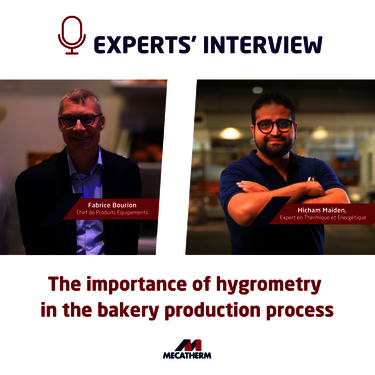Interviews: The importance of hygrometry in the bakery production process
Learn more about hygrometry and its importance in the manufacturing process of bakery, pastry, and patisserie products on an industrial scale.
Our MECATHERM experts, Hicham Maiden, Thermal and Energy Expert, and Fabrice Bourion, Equipment Product Manager, explain the impact of hygrometry on product quality, the challenges it poses for bakers, and the existing solutions for managing it.
What is oven hygrometry?
Hicham Maiden (HM):Hygrometry is the amount of water vapor in the air. Inside the baking chamber, it is the result of the quantity of steam injected into the oven, the quantity of steam generated by the products, the quantity of outside air entering the oven, and the quantity of humid air extracted from the oven.
Fabrice Bourion (FB): Hygrometry is a key parameter for bakers, as it has a significant impact on a number of characteristics that are key to the product's quality.
How does hygrometry impact product quality?
FB: Crust quality also depends on hygrometry. If hygrometry levels in the oven are too low, the result will be a very thick, dry, cracked crust. This crumbly crust is likely to break during packaging. Conversely, too much hygrometry will result in a soft, thin, wrinkled crust and a product that may collapse.
Hygrometry affects the water content of the finished product. The baker looks for the right balance between the expected softness and the optimum shelf life of his product.
The color of the product also depends on the level of hygrometry, from more colorful with a low level of hygrometry, to lighter color with a higher level.
Finally, hygrometry can have an impact on product development. A soft, moist surface will allow the dough to expand properly, which is normally ensured by the injection of steam at the start of baking, which then condenses on the products. An oven that is too dry can dry out the surface of the products too quickly, limiting their volume.
As a baker, it's a challenge to maintain a constant level of hygrometry throughout the production process and to guarantee consistent product quality in terms of its various characteristics, including volume, crust, color, shelf life, etc.
Why is managing hygrometry a challenge for bakers?
HM: Hygrometry is a highly fluctuating parameter that can be influenced by factors such as oven load or external weather conditions. However, in the industry, bakers seek the most consistent product quality possible to meet their customers’ expectations.
FB: Today, hygrometry in industrial ovens is empirically managed by the baker through the adjustment of moist air extraction via the extraction dampers. The steam injected by the ramps is a process parameter to create surface condensation at the beginning of baking that develops a shiny crust. This process requires skills and experience.
HM: In addition to impacting the desired product quality, inaccurate humidity management often leads to energy overconsumption due to excessive opening of the vents, which cools the oven. The successive injection of steam also results in energy overconsumption: as it is generally injected into the baking chamber at a lower temperature than that of the oven, the steam cools the oven.
What solutions are currently available to help industrial bakers manage hygrometry?
HM: The MECATHERM teams have worked on a solution to automate this hygrometry management inside the oven and optimize the resulting energy consumption: the Hygro Control System. This system allows automatic control of hygrometry level in the oven, ensuring consistent baking and optimal energy efficiency.
FB: This solution, which will be available on the market soon, will significantly simplify the daily management of humidity for industrial bakers.
Thank you to our experts for this informative interview!
Stay tuned to discover the new Hygro Control System soon!
About our experts:
Fabrice Bourion: Doctor in Industrial Microbiology, Fabrice also holds a baker’s diploma, acquired after several experiences in the bakery field. He joined MECATHERM in 2023, with nearly 30 years of experience in the agri-food sector.
Hicham Maiden: An industrial energy engineer, Hicham has 13 years of experience in this field. He joined MECATHERM 8 years ago as a thermal engineer, then evolved to the position of Thermal Project Manager, and recently to the position of Thermal and Energy Expert.

![[Translate to English:] [Translate to English:]](/fileadmin/_processed_/6/c/csm_experts-emailing_b1f1119837.jpg)

![[Translate to English:] [Translate to English:]](/fileadmin/_processed_/0/f/csm_email_hicham_b4069abe26.jpg)
![[Translate to English:] [Translate to English:]](/fileadmin/_processed_/5/3/csm_email_fabrice_93dbdcf69f.jpg)